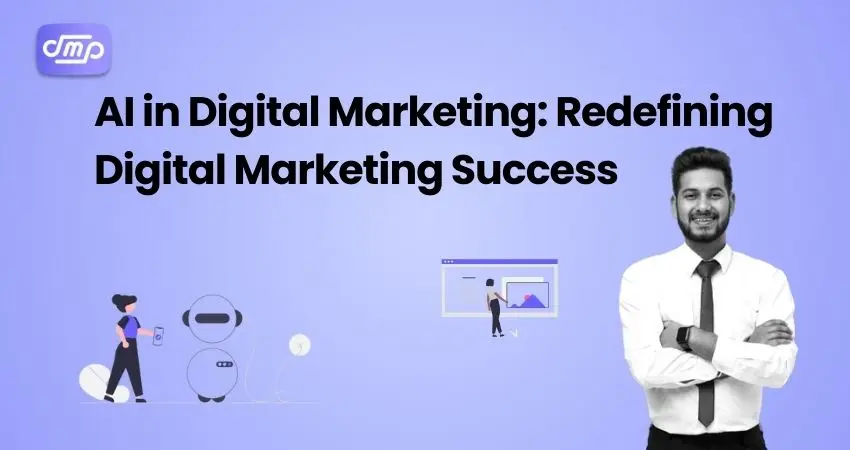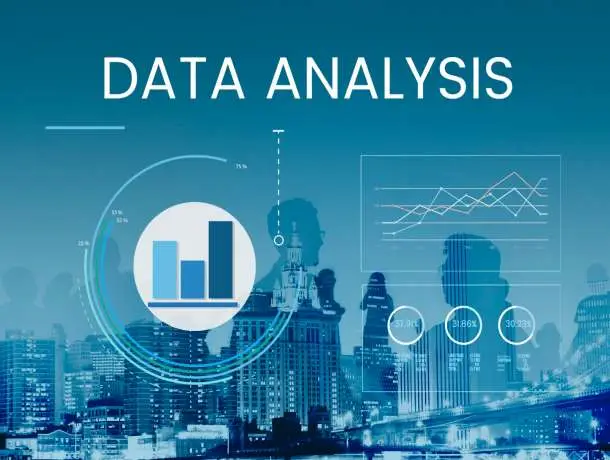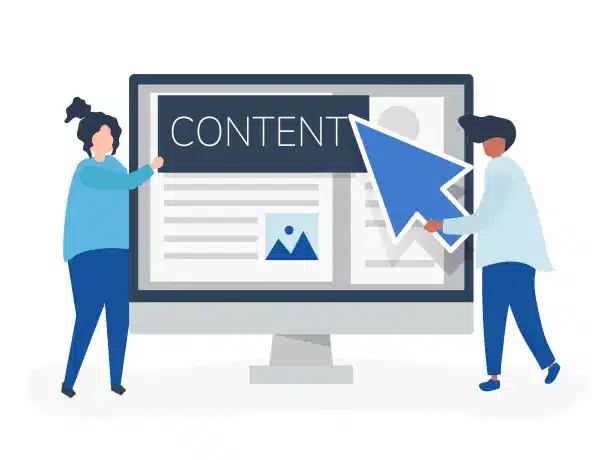
- May 8, 2024
- advertising and marketing, content marketing
- Digital Marketing
Table of Contents
Data analysis

Utilising artificial intelligence algorithms and methodologies, data analysis by AI in digital marketing entails processing, analysing, and deriving insights from massive amounts of data gathered from multiple sources
AI systems are capable of processing enormous volumes of data, both structured and unstructured, from a variety of sources, with ease. Marketers may collect and arrange data from several channels and touchpoints into a single database for analysis thanks to this data processing capacity.
Analytics systems driven by AI are able to find correlations, patterns, and trends in the data that conventional analytical techniques can miss. Through the identification of patterns in consumer behaviour, industry trends, and campaign outcomes, marketers can gain insightful knowledge that helps shape their approach.
Digital marketing is revolutionised by AI-driven data analysis, which gives marketers predictive tools, actionable insights, and real-time decision assistance. In today’s data-driven environment, marketers can better accomplish their marketing goals by utilising AI technologies to leverage data to drive strategic decisions and improve consumer experiences.
Personalisation with AI in Digital Marketing
AI systems are capable of analysing consumer data to generate customised email marketing campaigns, dynamic website content, and product suggestions. This degree of customisation raises conversion rates and improves user engagement. Using artificial intelligence algorithms and approaches to customise marketing messages, content, and experiences to each person’s preferences, interests, and behaviours is known as personalisation by AI in digital marketing.
AI systems divide audiences into discrete groups according to demographics, psychographics, previous interactions, and purchase history by analysing consumer data. Marketers may develop customised experiences and targeted campaigns that are suited to the distinct requirements and preferences of every customer category by segmenting their consumer base.
Artificial intelligence (AI)-driven solutions monitor and assess user activity on various digital platforms to comprehend personal tastes, browsing habits, and degrees of involvement. Through real-time behaviour analysis, marketers may present consumers with offers, relevant content, and suggestions for products based on their current interests and intent.
Digital marketers can provide their target audience with relevant, timely, and engaging experiences with AI-powered personalisation, which increases engagement, conversion rates, and customer loyalty. In today’s competitive market, marketers may accomplish their goals more successfully and build deeper relationships with their customers by utilising AI in digital marketing.
Predictive analytics
By using previous data to forecast future trends and behaviours, AI systems can assist marketers in anticipating the needs and preferences of their target audience.
Marketing tactics like estimating demand, locating possible leads, and fine-tuning pricing schemes can all benefit from predictive analytics. Using sophisticated algorithms, and predictive analysis with artificial intelligence, AI in digital marketing forecasts future trends, behaviours, and results based on past data, patterns, and predictive models.In order to forecast a customer’s future worth over the course of their lifetime, AI systems can examine past interactions with them, their purchase history, and demographic information.
Marketers can maximise long-term profitability by identifying high-value clients, personalising marketing campaigns, and allocating resources more efficiently. By examining previous behaviour, engagement metrics, and customer feedback, AI algorithms are able to detect early signs of client attrition. Marketers can reduce customer attrition and increase customer loyalty by employing targeted retention methods based on the identification of high-risk clients.
AI-powered predictive analysis enables marketers to foresee emerging trends, make data-driven choices, and enhance their campaigns for improved outcomes. Through the use of predictive analytics, marketers may obtain important insights into the competitive environment, market dynamics, and consumer behaviour. This helps them remain flexible and swiftly adjust to shifting market conditions.
Chatbots and Virtual Assistants
AI-driven chatbots and virtual assistants can help with purchases, respond to questions, and offer immediate customer service. Because these AI-powered interactions are available 24/7, customers are more satisfied because they receive prompt, accurate responses.
Chatbots and virtual assistants can help clients immediately by addressing typical inquiries, fixing problems, and assisting users with the sales process. Chatbots decrease response times, increase customer happiness, and improve user experience overall by providing 24/7 support.
By posing pertinent queries and gathering contact details, chatbots can proactively engage website visitors, start discussions, and qualify leads. Chatbots allow marketers to efficiently find high-potential prospects and nurture them through the sales funnel by instantly qualifying leads.
By examining user preferences, browsing history, and purchasing patterns, chatbots can make pertinent product and service recommendations to users. Chatbots raise average order value, boost sales, and boost conversion rates by offering individualised advice and support.
Interactive polls, surveys, and questionnaires are some of the ways that chatbots can obtain consumer input. Chatbots enable businesses to better understand client preferences, pinpoint areas for development, and obtain insightful data to improve their goods and services by gathering feedback in real time.
Businesses can provide individualised, responsive, and effective consumer interactions across many channels using chatbots and virtual assistants driven by AI. In the digital sphere, chatbots and virtual assistants increase customer engagement, boost sales, and improve overall marketing effectiveness by automating repetitive processes, offering immediate support, and customising user experiences.
Content Creation

Artificial intelligence (AI) tools are capable of producing articles, product descriptions, and social media postings automatically. Artificial intelligence (AI)-powered content creation can assist marketers in producing content at scale and optimising their workflow, but human involvement is still required to guarantee quality and relevancy.
Using artificial intelligence algorithms and tools to create, optimise, and disseminate a variety of content formats—such as blog posts, articles, videos, and graphics—is known as content creation with AI in digital marketing. Content can be automatically generated by AI-powered technologies depending on predefined characteristics, like topic, keywords, and tone of voice. These tools generate coherent, grammatically accurate, human-like content that is targeted to the intended audience using natural language generation (NLG) algorithms.
To maximise content visibility and impact, artificial intelligence (AI) algorithms examine user engagement data, search engine optimisation (SEO) best practices, and content performance metrics. To improve readability and SEO efficacy, content optimisation tools driven by artificial intelligence (AI) recommend tweaks to the headline, structure, keywords, and layout.
AI makes it possible to customise content recommendations and messaging for each unique user by examining user data, preferences, and behaviour. By presenting the appropriate content to the appropriate audience at the appropriate moment, personalised content raises relevance, engagement, and conversion rates.
Businesses can create high-quality, timely, and captivating content at scale while optimising content performance and maximising return on investment by utilising AI in digital marketing content development. In today’s cutthroat digital environment, marketers may personalise user experiences, expedite the process of creating content, and increase revenue by utilising AI technologies.
Ad targeting and Optimisation
AI systems are able to evaluate user data to target advertisements more precisely and provide real-time campaign optimisation. AI is able to determine the most appropriate audience segments and more effectively allocate advertising money by examining user behaviour and preferences.
Personalised, pertinent, and highly effective advertising campaigns are delivered through a variety of channels with the use of artificial intelligence algorithms and techniques in ad targeting and optimisation for digital marketing. To divide audiences into discrete categories, AI systems examine user data such as demographics, hobbies, behaviours, and past purchases. Through comprehension of audience segmentation, marketers can design focused advertising strategies that are suited to the distinct inclinations and requirements of each group.
Predictive analytics is made possible by artificial intelligence (AI) and allows for the prediction of which audience segments are most likely to interact with an advertisement and complete the intended activity, such as clicking, converting, or making a purchase. Marketers may maximise return on investment and optimise ad expenditure by focusing on high-potential audience segments.
Marketing Automation
AI-powered automation solutions can expedite time-consuming operations like lead nurturing, social media scheduling, and email marketing. This guarantees constant engagement with clients and frees up marketers to concentrate on more strategic endeavours.
Using artificial intelligence algorithms and technology to automate tedious operations, personalise customer interactions, and optimise marketing campaigns is known as marketing automation with AI in digital marketing. Lead data, including firmographics, internet behaviour, and demographics, is analysed by AI-powered lead scoring models to forecast the chance of conversion. Marketers may more efficiently nurture high-potential leads through the sales funnel and prioritise them for follow-up by grading leads according to their likelihood to convert.
AI creates content, offers, and subject lines for emails dynamically depending on user choices and behaviour, allowing for personalised email marketing campaigns. In order to segment email lists, plan send times, and optimise email content for maximum engagement and conversions, artificial intelligence (AI) algorithms analyse user data.
Content scheduling, posting, and channel monitoring are just a few of the chores that AI-powered social media management tools automate. In order to maximise content strategy and boost social media efficacy, AI algorithms examine trends, sentiment analysis, and engagement metrics.
With the use of AI and marketing automation, marketers may improve campaign performance, personalise interactions, and expedite procedures. To spur development and innovation in the cutthroat digital market of today, marketers may use AI technology to automate tedious operations, provide personalised experiences, and make data-driven decisions.
Conclusion
Artificial intelligence (AI) is transforming digital marketing by giving advertisers access to data-driven insights, personalising experiences, task automation, and campaign optimisation for improved outcomes. To produce engaging and genuine brand experiences, marketers must, however, find the ideal mix between human creativity and AI-driven efficiency.
By empowering marketers to provide individualised experiences, make data-driven decisions, automate procedures, and improve campaigns for better outcomes, AI in digital marketing has the potential to completely transform online marketing. AI technologies are predicted to have a greater influence on digital marketing as they develop, fostering innovation, efficiency, and competitiveness in the global economy.












